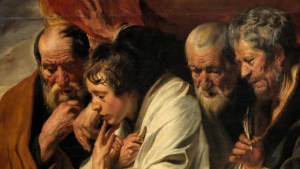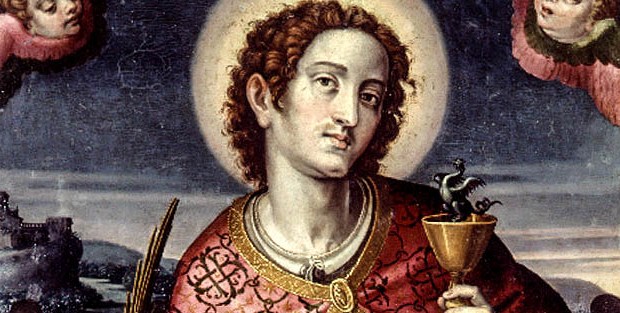The days following Christmas are full of symbolic meaning, as December 26 honors the first martyr, St. Stephen, who shed his blood for Jesus.
December 27, on the other hand, honors St. John the Evangelist, the disciple of Jesus who wrote the Gospel of John and the book of Revelation. Interestingly enough, he is the only gospel writer to omit a narrative of Jesus’ birth. Based on this fact alone it seems strange to include him during the Octave of Christmas.
What is the Church’s reason behind this choice?
The St. Andrew Daily Missal gives us a few clues.
It is God whom we adore at Bethlehem during Christmas time. Thus it was natural that St. John, the chief evangelist of the divinity of Christ, should be found beside the crib, to disclose the greatness of the Infant who reposes therein.The Infant God in the crib gathers around Him pure souls: Mary is the Blessed Virgin, Joseph the chaste spouse, St. Stephen the first martyr who washes his robe in the blood of the Lamb. Now behold St. John, the virgin apostle.
Dom Prosper Gueranger in his Liturgical Year similarly points to St. John’s pure chastity as a reason why he is honored near Christmas.
Nearest to Jesus’ Crib, after Stephen, stands John, the Apostle and Evangelist … next to the sacrifice of Blood, the noblest, the bravest, and which most wins the heart of Him who is the Spouse of souls, is the sacrifice of Virginity … If the Protomartyr dazzles us with the robes he wears of the bright scarlet of his own blood – is not the virginal whiteness of John’s vestment fairer than the untrod snow?
As a result, the Church seeks to highlight St. John’s focus on the divinity of Christas well as hold-up St. John as an prime example of virginity.
It should be noted that St. John’s feast is celebrated on December 27 in the Western Church, while the Eastern Church generally honors him on September 26.The Catholic Encyclopedianotes, “The ‘departure’ or ‘assumption’ of the Apostle is noted in the Menology of Constantinople and the Calendar of Naples (26 September), which seems to have been regarded as the date of his death.”

Read more:
Here’s how to get your wine blessed on the feast of St. John

Read more:
Can you identify the four evangelists by their symbols?

